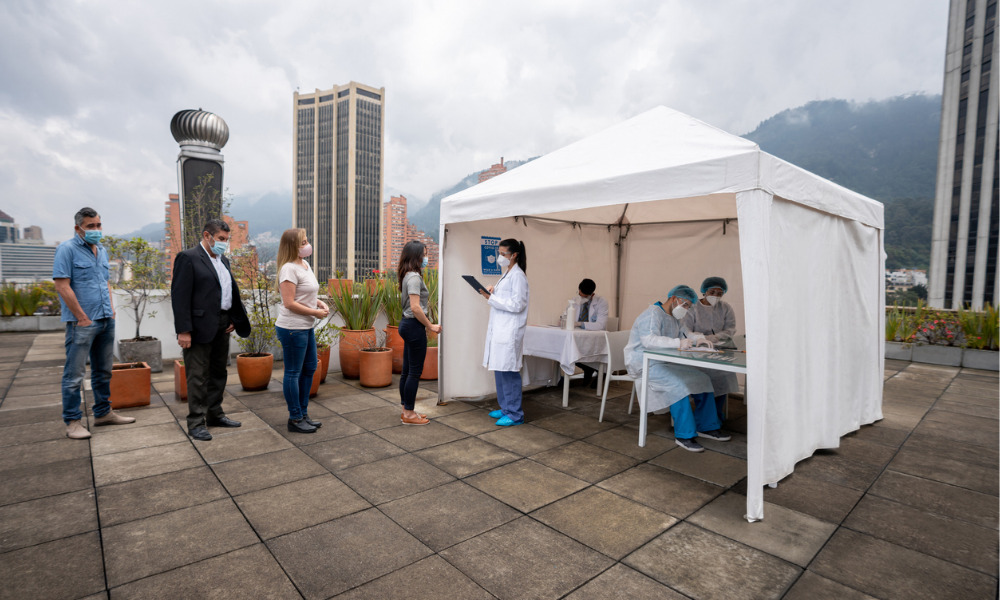
The private sector could play key role in enabling employees to get the jab

Australia’s biggest private sector employers could play a role in speeding up the country’s vaccine rollout.
Lieutenant-General John Frewen, who was brought in three weeks ago to take over the rollout strategy, said his team is considering how employers could help to incentivise vaccinations. Once supply is increased, we could see employers offering vaccinations in the workplace, in the same way many already facilitate the flu jab for staff.
Business Council of Australia chief executive officer Jennifer Westacott agreed that employers would be well placed to help the rollout and could begin preparations now so that once supply is available, they can vaccinate staff quickly.
It comes as Scott Morrison announced COVID-19 vaccinations would become mandatory for all residential agedcare workers from mid-September. The National Cabinet also endorsed the advice from the Australian Health Protection Principal Committee which recommends that all quarantine workers are vaccinated, including those transporting flight crew and passengers.
Speaking to HRD, Kyle Scott, director of Australian Business Lawyers & Advisors (ABLA), said the government’s direction gives employers a better legal footing to mandate the vaccine.
“I think employers who implement these requirements in the healthcare sectors will have a stronger prospect of having them upheld as being reasonable because of the latest announcement from the National Cabinet,” he said.
Read more: Are you a good leader – or a great one?
While employers can issue a directive for employees to be vaccinated against COVID-19, it must be lawful and reasonable – and that is where the grey area lies. Certain industries like agedcare and healthcare are more obviously high-risk than others. But unions have argued those working in aviation, as well as customer facing jobs like supermarket staff and hairdressers should also be prioritised. Supply issues and concerns over potential side effects from the AstraZeneca jab have added extra layers of complication.
Scott said employers should ensure they communicate the direction to staff in a reasonable manner and be prepared to revise the deadline if supply issues continue to persist before the mid-September date outlined by the government. HR leaders also have to consider that employees aged over 60 may be reluctant to have the AstraZeneca, despite the current health guidance.
“Whether it's reasonable to take disciplinary action against an employee who could have had the AstraZeneca but has chosen not to over preference for the Pfizer vaccine, that’s going to turn on a case-by-case basis and it’s also going to depend on the industry that we're talking about,” he said.
However, the main barrier employers in the agedcare sector are likely come up against is facilitating their staff to go offsite to get vaccinated. In a sector already plagued by staff shortages, employers will play a key role in helping staff to get the vaccine in the easiest way possible. Alongside the mandate, Morrison also announced a $11m vaccination support grant for the agedcare sector.
Residential Aged Care Facilities will be allocated funding to reimburse casual staff for time off to get vaccinated and sick leave if they suffer from side effects as a result of the jab. Facilities will also be given money to facilitate off-site visits for groups of staff, such as covering the cost of transport.
Read more: COVID-19 vaccinations could lead to divided workplaces
The industry appears to be divided over the issue of mandatory vaccinations. Aged & Community Services Australia (ACSA) welcomed the decision, but unions have warned that making the jab mandatory will drive some low-paid employees out of the industry.
The government has yet to announce any guidelines around the mandate and how employers should manage the issue of exemptions. Scott said state and territory governments may address the issue in those guidelines, or they may leave it up to employers to navigate. Either way, employers should consider their process for dealing with employees who refuse to be vaccinated.
“I think valid exemptions at the moment will be only in very limited circumstances which effectively fall into three categories,” Scott said. “The first is on medical grounds which would require prior history of adverse reactions to vaccinations and proof of that from a health practitioner. The second category may be people with a disability where the medical advice is for that person not to have the vaccine. The third would be on freedom of religion grounds.”
In the case of an employee refusing to be vaccinated, employers may need to carry out risk assessments of the individual’s role and consider redeployment options before going down the path of dismissal. But like many other challenges faced by employers in the last year, there is no rulebook. Scott said employers should wait for the further guidelines from state or federal government surrounding the mandate and begin by considering how best to communicate the messaging to staff.